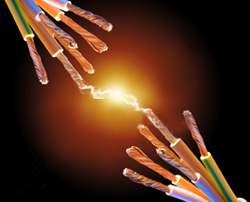Do I really need an AC (alternating current) power conditioner or regulator? Isn’t my surge protector enough?
Two of the most commonly asked questions regarding power, for sure.
Answers, in part, come from an understanding of modern-day realities. AC power is far noisier and contaminated than at any time since its inception.
This is due not only to an increased population taxing utility lines, but also because of the proliferation of computers and microprocessors.
These devices typically run on switching power supplies, which can have a devastating effect on noise levels as well as on the bandwidth and character of the noise.
The past 20 years or so have seen a 100-fold increase in AC noise (Figure 1), while at the same time, performance expectations from audio (and video) devices/systems has risen dramatically.
AC power is the foundation of every critical component used in a system, so as AC power quality deteriorates, so too does audio and video performance (and reliability).
A bit more specifically, line noise can smear, mask, and distort high-resolution signal, seriously compromising performance. These AC anomalies arrive from your breaker panel or service, and ultimately flow into every sensitive circuit.

Better Yields Less
Experiencing the benefit of system components like superior audio processors, microphone pre-amps and even line array loudspeakers requires resolution.
To achieve this, low-level audio information must be rendered without distortion, unmasked, pristine.
Thus the paradox: as the AC noise level continues to rise, advanced audio technologies yield less and less of their potential, because low-level information is either masked or distorted. Additionally, trouble-free performance with unwavering microprocessor presets calls for highly stable AC power.
Years ago, we all drank water from the household tap. How many of us continue to do so?
Under current conditions, a rack of components that’s been without problems in 10 prior projects may hum, buzz, and worse come project number 11.
Why? Because the circumstances that produce ground loops can be quite complicated and are affected by the internal grounding scheme of the components.
In spite of efforts to create dedicated AC lines and “star-configured” AC cable grounds, in the end, few systems render an ideal “zero ohms” between ground connections. Lighting equipment, large appliances or machinery that share the same power grid can easily cause ground noise.
Quite often discrete power from generators is not possible, or may not be desired, given current limitations, ambient noise, and voltage stability concerns. Unfortunately, AC ground contamination, loops, and distortion may result.















